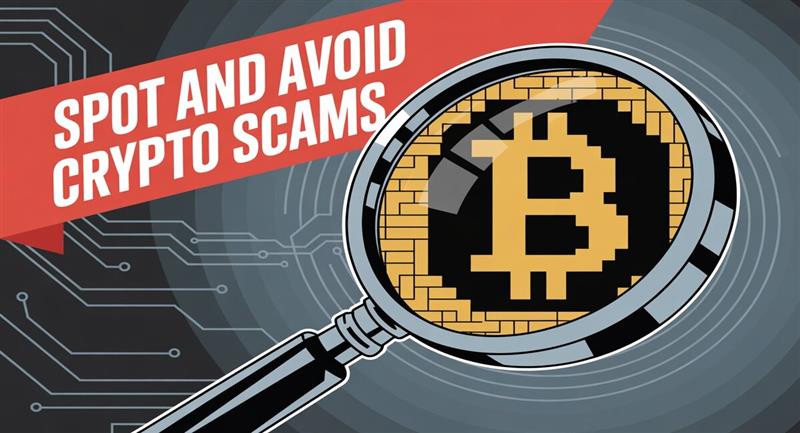
How to Spot and Avoid Crypto Scams & Phishing: Security Tips for Indian Traders

Cryptocurrency has become one of the fastest-growing investment and trading opportunities in India and worldwide. But with rising popularity comes a sharp increase in scams, fraud, and phishing attacks. For Indian traders, learning how to spot and Avoid Crypto Scams is no longer optional—it’s a necessity. In this blog, you’ll discover how to recognize red flags, secure your assets, and take practical steps to protect yourself while trading.
Why Protecting Against Crypto Scams Matters
In 2024 alone, billions of dollars were lost globally to crypto scams, with India also witnessing a rise in fraud cases. Most scams are sophisticated, involving fake websites, phishing links, rug pulls, or impersonation of trusted platforms. The good news is that with awareness and preventive measures, you can drastically reduce the risk.
Key Principles to Spot and Avoid Crypto Scams
1. Treat unsolicited offers with suspicion
If you receive unexpected investment messages, “guaranteed returns” offers, or unknown links via WhatsApp, Telegram, email, or social media—treat them as scams. Fraudsters often lure victims with fake testimonials or small initial payouts.
2. Verify the platform and contracts
Always double-check the exact website URL, SSL security certificate, and source of any crypto exchange or wallet before logging in. Stick to verified and reputed platforms. In DeFi projects, review smart contracts, audits, and token ownership before investing.
3. Never share private keys or seed phrases
Your private key or recovery phrase is the gateway to your crypto. No legitimate support team will ever ask for it. Store them securely offline, preferably using a hardware wallet.
4. Use Two-Factor Authentication (2FA)
Enable app-based 2FA for all crypto accounts. Avoid SMS-based 2FA because of SIM-swap risks. Regularly review your active devices and logins.
5. Stay alert to social engineering
Romance scams, fake friendships, and long-term “trust-building” schemes are common. If anyone you meet online pressures you to invest in crypto, slow down and verify.
Common Types of Crypto Scams
1. Phishing websites & emails
Fraudsters create fake exchange websites or send emails that look identical to legitimate platforms. Check for small typos in URLs, lack of HTTPS, or pop-ups asking for wallet connections.
2. Rug pulls & fake tokens
DeFi projects that promise unrealistic yields but suddenly vanish with investor funds are rug pulls. Warning signs include anonymous founders, no liquidity lock, and no independent audits.
3. Fake customer support
Scammers pretend to be “exchange support staff.” They ask for OTPs, passwords, or keys. Always confirm official support channels directly from the platform.
4. Ponzi & pyramid schemes
If you are promised fixed daily returns or profits that double overnight, it’s a scam. Many schemes rely on referral commissions and collapse once recruitment stops.
5. Airdrop & giveaway fraud
“Free token” offers that require you to pay a fee or share your seed phrase are fake. Genuine airdrops don’t ask for upfront payments.
Practical Safety Measures
Trade on trusted exchanges – Always use regulated and reputed platforms.
Keep devices updated – Install the latest OS updates, antivirus software, and avoid public Wi-Fi for trading.
Use separate wallets – Store only small trading balances online and keep larger holdings in hardware (cold) wallets.
Research projects thoroughly – Check team backgrounds, whitepapers, and community feedback.
Limit wallet permissions – Revoke unnecessary smart contract approvals regularly.
Reporting and Recovery in India
If you fall victim to a scam:
File a complaint at your nearest cybercrime police station.
Report to the Indian Cyber Crime Coordination Centre (I4C).
Share wallet addresses, transaction IDs, and screenshots as evidence.
Contact your exchange’s support immediately—quick reporting can sometimes prevent fund withdrawal.
Advanced Detection Techniques
On-chain analysis – Check token flows on block explorers. Rapid fund movement across wallets is suspicious.
Audit reports – Don’t rely only on the presence of an audit; review whether issues were fixed.
Use scam databases – Rely on community blacklists and exchange warnings for verification.
Case Studies & Latest Scam Trends
Pig-butchering scams: Scammers build long-term online relationships, then lure victims into fake investments.
AI-powered scams: Voice cloning and deepfake videos are now used to impersonate trusted figures.
By being cautious, you can Spot and Avoid Crypto Scams even in these advanced forms.
Final Checklist
Pause before you click on any link.
Double-check official websites.
Store most funds offline.
Report suspicious activities quickly.
Conclusion
Crypto scams are getting smarter every year, but so can you. The ability to Spot and Avoid Crypto Scams comes down to awareness, verification, and disciplined security habits. If you’re ready to start or scale your trading journey, make sure you choose a trusted exchange, stay alert to red flags, and keep your digital assets secure.
Ready to start your crypto journey the safe way?
Don’t fall prey to scams—trade only on trusted platforms. With BuyUcoin, you can buy crypto in India securely, access exclusive offers, and enjoy the confidence of a regulated exchange. Sign up today and take your first step toward smarter, safer investing.
Sign up on BuyUcoin now to trade crypto with complete peace of mind, benefit from exciting discounts and offers, and join thousands of Indian traders building their portfolios securely every day.